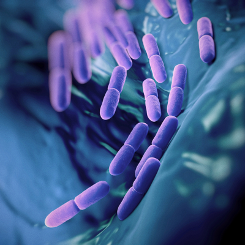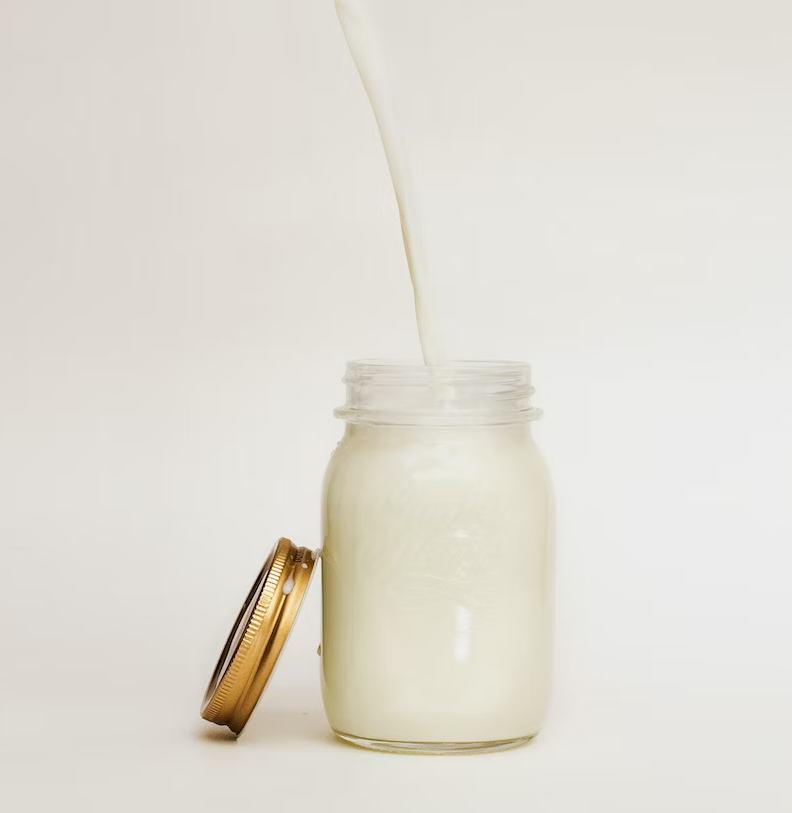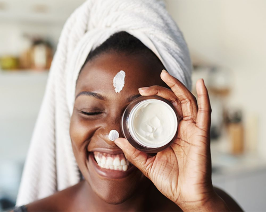Introduction

Gradually, probiotics have become a force to reckon with in the world of health and wellness in recent years, and this is for good reason. They are friendly bacteria that provide numerous benefits to our bodies, from improving digestion and boosting immunity to even supporting our skin health. There is no end to the impressive benefits of these “good” bacteria.
Probiotics have been associated with several health benefits, including weight loss, improved digestion, enhanced immune function, reduced risk of some diseases, and healthier skin, amongst others, especially healthier skin.
The skin, being the largest organ in our body, plays a crucial role in protecting us from external stressors such as UV radiation, pollution, and pathogens. However, it can also be affected by internal factors such as diet, hormonal changes, and stress. Poor skin health can result in a range of problems, from acne and dryness to premature aging and wrinkles. This can take such a heavy toll on appearance and self-esteem.
Hence, in this article, we will explore the
benefits of probiotics for skin health
based on scientific research and studies. There is more. We will also consider the different ways of using probiotics for skin health, including topical application, oral supplements, and food sources.
So, let’s get right into it!!
What are Probiotics?
In simple terms, probiotics are live microorganisms that provide health benefits to the host when consumed in adequate amounts. According to
The World Health Organization (WHO)
, probiotics are “live microorganisms that, when administered in adequate amounts, confer a health benefit on the host.”
These friendly bacteria are found in certain foods and supplements, and even naturally occur in our bodies. They are similar to the beneficial bacteria that naturally reside in our digestive system, helping to maintain a healthy balance of microorganisms in the gut.
Types of Probiotics

There are
several types of probiotics
, but the most common ones belong to two groups:
Lactobacillus and Bifidobacterium
.
Lactobacillus
bacteria are found in fermented foods such as yogurt, kefir, and sauerkraut, while
Bifidobacterium
bacteria are found in some dairy products and supplements.
These two types of probiotics have been used in the treatment of colon cancer and colorectal cancer, to boost the immune system and prevent infections, and
improve the remedy of metabolic diseases, amongst others
.
Probiotics can be found in many food sources, including fermented dairy products, such as yogurt and kefir, and non-dairy products, such as kimchi, sauerkraut, and miso. Other sources of probiotics include supplements and fortified foods, such as cereals and energy bars.
However, although probiotics are commonly found in fermented products,
not all fermented foods contain probiotics
. For example, beer and wine are fermented but don’t contain live bacteria. Also, the amount and type of probiotics in a food or supplement may vary, so it’s essential to read labels carefully and choose products from reputable brands.
Research suggests that consuming
probiotics in supplement form may be more effective
than relying solely on food sources. Probiotic supplements are available in capsules, tablets, powders, and even liquids.
Let’s consider the science behind how probiotics work and their relationship with skin health.
Five Benefits of Probiotics For The Skin

Probiotics have many impressive benefits for the skin and the overall well-being of the body as a whole. However, we will only consider five impressive ways probiotics can be of benefit to your skin. Let’s get right to it!
1.
Improved Hydration
Probiotics can improve skin hydration by promoting the production of ceramides,
which are natural lipids that help to retain moisture in the skin.
A study published in the
Journal of Clinical and Aesthetic Dermatology
found that a topical probiotic cream containing
Lactobacillus plantarum
improved skin hydration and barrier function in patients with atopic dermatitis.
Moreso, research published in the
International Journal of Cosmetic Science
showed that a probiotic-containing cream improved skin hydration in healthy volunteers.
2.
Reduced Inflammation
Although inflammation is an essential part of the body’s immune response, it is a common underlying factor in many skin conditions, including acne, rosacea, and eczema.
Probiotics can help to reduce inflammation
by modulating the immune system and reducing the production of pro-inflammatory cytokines.
A
study
also found that a probiotic supplement containing
Lactobacillus rhamnosus
reduced acne severity and improved skin barrier function in patients with acne vulgaris. Finally, research showed that a
probiotic supplement may help reduce
skin inflammation
and improve clinical outcomes in patients with rosacea.
3.
Increased Collagen Production
Collagen, produced naturally by the skin, is a protein that gives the skin its structure and elasticity. As we grow old, collagen production naturally declines, leading to the formation of fine lines and wrinkles.
Probiotics can help to stimulate collagen production by promoting the growth of fibroblasts
, which are cells that produce collagen.
A study found that a
probiotic supplement may help increase collagen production in vitro
. In fact, another
research
showed that a probiotic-containing beverage increased collagen synthesis and improved skin texture in healthy volunteers.
4.
Improved Skin Barrier Function
The skin barrier plays a critical role in
maintaining overall skin health
. A healthy barrier helps to prevent moisture loss, protect against environmental toxins and irritants, and maintain optimal hydration levels. Probiotics can help to improve skin barrier function by promoting the production of some natural lipids that help to boost the strength of the skin barrier.
A study found that a
probiotic-containing cream improved skin barrier function
and reduced skin sensitivity in patients with atopic dermatitis. The same study showed that a topical probiotic cream containing Streptococcus thermophilus improved skin barrier function in healthy volunteers.
5.
Reduced Signs of Aging
Probiotics may help to
reduce the signs of aging
by improving skin hydration, reducing inflammation, and stimulating collagen production. Research published in the
Journal of the American Academy of Dermatology
found that a probiotic supplement containing
Lactobacillus acidophilus
and
Bifidobacterium bifidum
improved skin hydration and reduced the appearance of fine lines and wrinkles in healthy volunteers.
Another
study
published showed that a probiotic-containing cream improved skin elasticity and reduced the appearance of wrinkles in postmenopausal women.
There you have amazing benefits of probiotics for your skin. Let’s consider the different ways to consume probiotics.
How To Use Probiotics
Probiotics can be used for skin health in several ways, including topical application, oral supplements, and consuming foods high in probiotics.
1.
Topical Application

Topical probiotic products, such as creams and serums, can be applied directly to the skin to help improve the skin’s microbiome and overall health. These products contain live strains of beneficial bacteria that can help to balance the skin’s microbiome and improve skin hydration, barrier function, and reduce inflammation.
However, ensure you follow the instructions provided by the manufacturer and use the product consistently over time. Most products should be applied to clean, dry skin once or twice daily, depending on the formulation.
2.
Oral Supplements

Oral probiotic supplements can also be used to support skin health. Oral probiotic supplements contain friendly bacteria that can help to improve gut health, which in turn can have positive effects on skin health.
When choosing an oral probiotic supplement for skin health, however, ensure you select a high-quality product that contains strains of bacteria that have been shown to be beneficial for skin health, such as
Lactobacillus
and
Bifidobacterium.
3.
Foods High in Probiotics

In addition to using topical products and oral supplements, consuming foods that are high in probiotics can also help to support skin health. Examples of such foods include fermented foods such as yogurt, kefir, sauerkraut, kimchi, and kombucha.
When incorporating probiotic-rich foods into your diet, choose foods that are high-quality and minimally processed. Also, be patient and consume these foods consistently over time to see the complete benefits for skin health.
Possible Side Effects of Probiotics
While probiotics are generally safe for most people, there are some precautions and potential side effects to be aware of when using probiotics for skin health.
Some people may experience mild side effects when using probiotics, such as digestive discomfort, bloating, or gas. These side effects are generally mild and temporary and can be reduced by starting with a lower dose and gradually increasing it over time.
However, in very rare cases, more severe side effects can occur, such as infections or allergic reactions. If you experience any unusual symptoms while using probiotics, such as fever, severe abdominal pain, or difficulty breathing, stop using the product and seek your doctor.
Moreso, individuals who have a weakened immune system or have certain medical conditions may be more susceptible to infections or other complications from probiotics. If you belong in this category, ensure you speak with your healthcare provider before starting any new supplement or skincare regimen, including probiotics.
How to Choose the Right Probiotic Product
When choosing a probiotic product for skin health, the first thing is to ensure the product is from a reputable manufacturer. Preferably, go for products that contain strains of bacteria that are beneficial for skin health, such as
Lactobacillus
and
Bifidobacterium.
Also, choose a product that is formulated for your specific skin type and concerns. For example, if you have dry skin, look for a probiotic product that is formulated to hydrate and moisturize the skin.
Conclusion
Probiotics are the new big thing in the health and wellness industry. They provide your skin and virtually all parts of the body with impressive benefits. They are easy to use and incorporate into your skincare routine and diet to enjoy maximum benefits.
However, ensure you speak with your healthcare provider or dermatologist before starting any new treatments to ensure their safety and effectiveness.
References
-
Mack, D. R. (2005). Probiotics: Mixed messages. Canadian Family Physician, 51(11), 1455-1457.
https://www.ncbi.nlm.nih.gov/pmc/articles/PMC1479485/
-
Salem, I., Ramser, A., Isham, N., & Ghannoum, M. A. (2018). The Gut Microbiome as a Major Regulator of the Gut-Skin Axis. Frontiers in Microbiology, 9.
https://doi.org/10.3389/fmicb.2018.01459
-
Swanson, K. S., Gibson, G. R., Hutkins, R., Reimer, R. A., Reid, G., Verbeke, K., Scott, K. P., Holscher, H. D., Azad, M. B., Delzenne, N. M., & Sanders, M. E. (2020). The International Scientific Association for Probiotics and Prebiotics (ISAPP) consensus statement on the definition and scope of synbiotics. Nature Reviews Gastroenterology & Hepatology, 17(11), 687-701.
https://doi.org/10.1038/s41575-020-0344-2
-
Abdelhamid, A. G., El-Masry, S. S., & El-Dougdoug, N. K. (2019). Probiotic Lactobacillus and Bifidobacterium strains possess safety characteristics, antiviral activities and host adherence factors revealed by genome mining. The EPMA Journal, 10(4), 337-350.
https://doi.org/10.1007/s13167-019-00184-z
- Hemarajata P, Versalovic J. Effects of probiotics on gut microbiota: mechanisms of intestinal immunomodulation and neuromodulation. Therap Adv Gastroenterol. 2013 Jan;6(1):39-51. doi: 10.1177/1756283X12459294. PMID: 23320049; PMCID: PMC3539293.
-
Markowiak, P., & Śliżewska, K. (2017). Effects of Probiotics, Prebiotics, and Synbiotics on Human Health. Nutrients, 9(9).
https://doi.org/10.3390/nu9091021
-
Habeebuddin, M., Karnati, R. K., Shiroorkar, P. N., Nagaraja, S., Basheeruddin Asdaq, S. M., Anwer, M. K., & Fattepur, S. (2022). Topical Probiotics: More Than a Skin Deep. Pharmaceutics, 14(3).
https://doi.org/10.3390/pharmaceutics14030557
-
Cristofori, F., Dargenio, V. N., Dargenio, C., Miniello, V. L., Barone, M., & Francavilla, R. (2021). Anti-Inflammatory and Immunomodulatory Effects of Probiotics in Gut Inflammation: A Door to the Body. Frontiers in Immunology, 12.
https://doi.org/10.3389/fimmu.2021.578386
-
Teng, Y., Huang, Y., Danfeng, X., Tao, X., & Fan, Y. (2022). The Role of Probiotics in Skin Photoaging and Related Mechanisms: A Review. Clinical, Cosmetic and Investigational Dermatology, 15, 2455-2464.
https://doi.org/10.2147/CCID.S388954
-
Papadimitriou, K., Zoumpopoulou, G., Foligné, B., Alexandraki, V., Kazou, M., Pot, B., & Tsakalidou, E. (2015). Discovering probiotic microorganisms: In vitro, in vivo, genetic and omics approaches. Frontiers in Microbiology, 6.
https://doi.org/10.3389/fmicb.2015.00058
-
Rosso, J. D., Zeichner, J., Alexis, A., Cohen, D., & Berson, D. (2016). Understanding the Epidermal Barrier in Healthy and Compromised Skin: Clinically Relevant Information for the Dermatology Practitioner: Proceedings of an Expert Panel Roundtable Meeting. The Journal of Clinical and Aesthetic Dermatology, 9(4 Suppl 1), S2.
https://www.ncbi.nlm.nih.gov/pmc/articles/PMC5608132/
-
Dolan, K. E., Pizano, J. M., Gossard, C. M., Williamson, C. B., Burns, C. M., Gasta, M. G., Finley, H. J., Parker, E. C., & Lipski, E. A. (2017). Probiotics and Disease: A Comprehensive Summary—Part 6, Skin Health. Integrative Medicine: A Clinician’s Journal, 16(4), 32-41.
https://www.ncbi.nlm.nih.gov/pmc/articles/PMC6415629/

 By myulikeadmin
By myulikeadmin



